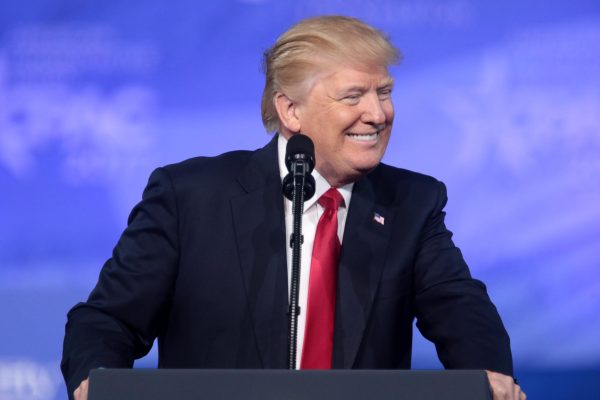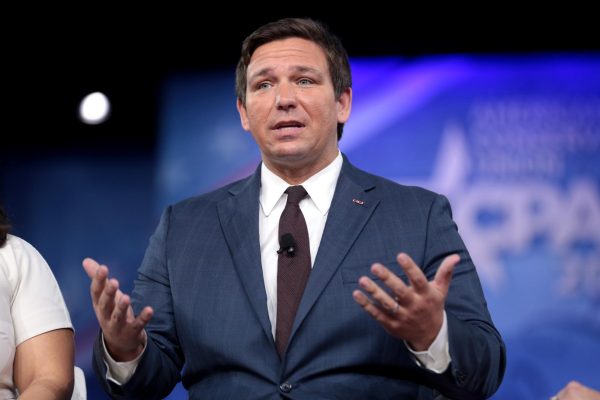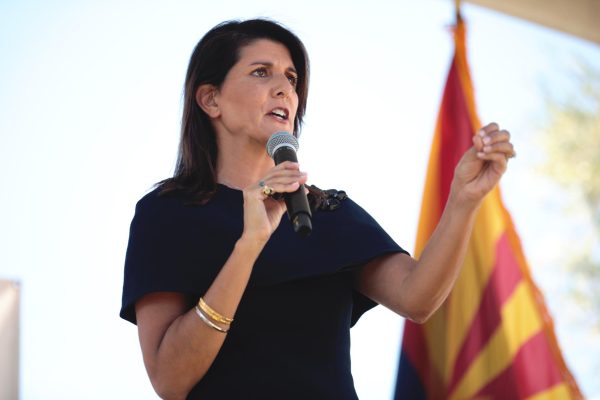Since June 22 of last year, when former Republican Congressman Will Hurd verbally declared his run for the presidency, 12 other Republican politicians have begun the grueling trek to put their name on the desk of the Oval Office. With polling indicating 7 strong contenders, who’s currently outrunning the Red Wave?
Expectedly the Republican favorite, President Trump is currently leading the polls with a 55% lead over the next candidate, Governor Ron DeSantis.

However, he has actually taken a step back from the campaign trail this year and has instead utilized his existing hold over the party to justify not holding as many campaign rallies. Trump is currently facing 91 felony counts across four different criminal cases, causing him to appear within circuit courts more often than on a campaign stage—choosing to not even attend the first two Republican Presidential Debates. And, although Trump maintains a large community of die-hard supporters within the Republican party, nearly 60% of Republicans don’t appreciate the way Trump acted while in the White House.
Yale & Harvard graduate Ron DeSantis is largely considered Trump’s most viable opponent for the Republican ticket.

Through DeSantis’ political career, he has consistently aligned himself with Trump on decisive issues. But, recently, he’s begun distancing himself from Trump, criticizing Trump’s views on a myriad of topics—including Trump’s criticism of Florida’s abortion ban. Although DeSantis is far ahead of the other five candidates, holding 14% of the polls, he has one key factor working against him: Trump is not his biggest fan. Trump, who was once DeSantis’ largest endorsement during his 2018 Florida gubernatorial run, will now take any opportunity to castigate DeSantis as unfit to govern as president—even christening him with the nickname “Ron DeSanctimonious.”
Former South Carolina Governor and United Nations Ambassador Nikki Haley appears to be the next most likely candidate, amassing 6% of Republican support.

Haley holds certain qualities separating her from the remainder of the Republican competition. In addition to being the only female candidate running, Haley has consistently set herself apart as one of the more independent members of the Republican party—leading her to lack a strong voter base of her own. Despite sharing traditionally Republican views on topics such as gun control, border control, and foreign policy, she dissents from the majority on other issues like abortion, climate action, and the economy—going as far as saying Biden himself isn’t solely to blame for the U.S.’s current economic state.
After DeSantis, exceeding all expectations, Vivek Ramaswamy is the 3rd most favorable candidate—receiving 8% of national polls and passing both Haley and former vice president Pence.

Ramaswamy quickly made a name for himself during the first Republican debate by playing the role of the ideal Republican candidate. In his closing statement, Ramaswamy even went on to say, “Fossil fuels are a requirement for human prosperity. Reverse racism is racism. An open border is not a border,” ideas all derived from the core ideals of the modern Republican agenda.
So, all candidates considered—who is currently the most likely choice to top the Republican ticket? Well, if Trump enters back into the public eye, it’s a pretty good call that he wins the primaries for the second time. However, due to conversations surrounding the application of the 14th Amendment—which disallows someone convicted of inciting an insurrection from holding public office—beginning again, a different candidate taking the prize is not out of the question.
Currently, DeSantis is second in the polls, so that implies that he would be the next pick. However, if Trump’s voter base chooses not to vote for Trump, they would not choose to back a candidate who has spent the majority of the last year butting heads with the former president.
And, although Nikki Haley appears to be the most level-headed candidate—that very quality could be the reason she doesn’t amass enough votes to outperform the others. During her campaign rallies and speeches, Haley has positioned herself as a mediator between the two political parties and called out failures on both sides of the political spectrum. Those actions may disincentivize solid Republicans from standing behind her.
So, with two of the leading candidates out of the way, the only one who remains is Vivek Ramaswamy. Even disregarding the fact that he had the second-most airtime out of all the candidates during the first debate, and that his approval ratings are rising faster than any other Republican candidate—his consistency in backing President Trump and his lack of political background could be the reason he wins the primary election.
The modern Republican party desires a candidate who will voice the values of the party and advocate for Republican policies regardless of the implication; Trump did that, and now, so will Ramaswamy. Ramaswamy is unafraid to stand by the most controversial Republican policies, even if he receives mass public pushback. As Trump continues to maintain a hold over the Republican party, voters won’t back a candidate who outwardly opposes Trump and his policies—and Ramaswamy is as far from that as possible.
Nevertheless, new developments could swing the polls in completely opposite directions. So, as the election season continues to pick up speed over the coming year, we will see whether Trump can maintain his control over the party now synonymous with his name, or if Ramaswamy lives up to his aspirations and becomes the conservative blessing Republicans have been looking for since the 2020 election.


